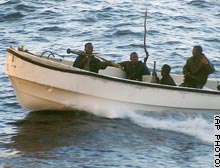Somali pirates force UN food aid to take arduous land route
UN release
December 5, 2005
Somali’s government signs $50 million deal with mercenaries to fight pirates.
5 December 2005 Facing a plague of piracy off the Horn of Africa that has closed its usual supply lines by sea, the United Nations World Food programme (WFP) today announced the arrival in southern Somalia of its first overland truck convoy carrying food aid in almost five years, and called for urgent funding to make up for the increased costs.
“This is a great achievement, but sadly it was forced on us by the pirates who have attacked our chartered ships and other vessels this year,” WFP Somalia Country Director Zlatan Milisic said of the 14 trucks that reached the Bakol region yesterday after an arduous 1,200-kilometre drive from the Kenyan port of Mombasa, passing through 25 militia checkpoints in Somalia.
“It is 25-30 per cent cheaper to bring our food aid in by sea and boats can carry much more, but we have had to resort to this land route because ship-owners feel it is too risky to sail to the south,” he added. The country has been torn by factional fighting ever since the collapse of President Muhammad Siad Barre’s regime in 1991.
WFP distributed some of the food to 720 internally displaced people and returnees on the edge of Wajid town within hours of the convoy’s arrival. Three more trucks, which were delayed by breakdowns, are expected to arrive in Wajid within days. The convoy of WFP-contracted trucks was loaded with 500 tons of food.
 Pirates attacking a Carnival cruise ship off the coast of Somalia in early VNovember. The picture is taken by a passenger on the ship. Photo courtesy of the AP SOMALIA: Food shortages worsen as piracy slows aid delivery (IRIN) Hundreds of thousands of people in southern Somalia face the prospect of worsening food shortages, as poor seasonal rains coincide with severe difficulties in transporting food aid to the country. The World Food Programme has been forced by pirates to transport food overland from Kenya which it says costs 25-30 percent more than a sea route. |
“We are having to use land convoys just when the humanitarian situation in southern Somalia is deteriorating,” Mr. Milisic said. “It couldn’t happen at a worse time; the current rains in the south are failing and there will be severe food shortages, so WFP must rapidly increase deliveries to the south, and that will be very difficult.”
Out of the more than 1 million people in Somalia that WFP aims to reach with food aid in 2005, 640,000 people are in the south. In a worst-case scenario, WFP would need 50,000 tons of food aid for the hungry in the south for the next six months.
WFP’s food aid stocks in Somalia are at an all-time low because of the spate of ship hijackings, including the seizure this year of two WFP-chartered vessels, one of which was held for three months. Ship owners are now demanding armed escorts. Waters off Somalia are considered among the world’s most dangerous. Somalia’s Transitional Federal Government signed a two-year contract in November worth more than $50 million with New York-based Topcat Marine Security to take action against the pirates.
As well as using the route from Kenya to southern Somalia for the first time since February 2001, WFP is planning to bring in food aid overland from Djibouti into northern Somalia.
“We urgently need more funding, given the increasing food needs and rising transport costs, as well as better access to the affected communities,” Mr. Milisic said.
To date, the WFP operation has a shortfall of $17 million or 24 per cent of the total.
This story contains a modified news release from the U.N. press service.







